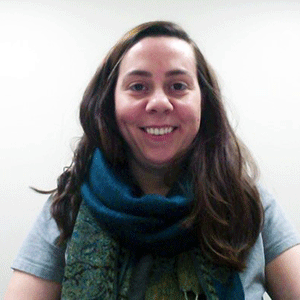
eLearning Director Welcomes “Big Mental Shift”
AHS E-News Fall 2020

When Dr. Sara Shrader was hired in January as the Director of Online Learning in the College of Applied Health Sciences, her mission was to coordinate and centralize the development and administration of online courses and programs for all of the College’s units. She envisioned her goal as that of bringing AHS together as a whole, not only managing existing online courses but also developing a strategy for building a portfolio that would include high-quality, fully online degree and certificate programs.
Then came the coronavirus.
“In March, all of a sudden everything hit the fan and we had a week or two of scrambling to figure things out and get everyone and everything online,” Dr. Shrader said. She had to worry about things that aren’t normally on her radar, such as bandwidth issues. “I did a lot of tech support, and spent a lot of time making sure people didn’t feel lost,” she said. She also became deeply involved in the Online Teaching Academy, created by the University of Illinois Provost’s Office to support faculty across campus with instruction on best practices in online learning and course design.
She has nothing but praise for AHS faculty and instructional staff, who showed a strong commitment to creating a quality online experience for students even when their initial views of online teaching may have been negative. “Face-to-face just feels more organic to some people, more natural,” she said. “They see online teaching as a lesser modality and don’t think it’s as good. Part of my job is showing them that it isn’t less; it’s just different.”
Making that “big mental shift,” as Dr. Shrader put it, has been facilitated by the pandemic, which gave everyone the opportunity to experience “the goodness that can be found in online teaching.” She thinks the pandemic has the potential to make a long-term impact on teaching and learning. “Education has been criticized for being slow in innovating,” she said. “When people think of the college classroom, they picture a large lecture hall filled with students, and an instructor at the front of the room. Using technology can help us escape that mode.”
The online teaching environment, she argues, is a more democratic space in that students who might be intimidated about approaching an instructor in a large lecture hall may feel more empowered to do so in a virtual classroom. Moreover, technology enables instructors to meet students where they are. “Students are using technology and social media in ways that instructors don’t even understand at this point,” she said. “I’m hoping that this gives more power to students to take charge of their learning.”
One may be hard-pressed to find a silver lining to the cloud of the coronavirus pandemic, but the opportunity it gave instructors, administrators, and students to appreciate the important role that technology can play in teaching and learning is a good thing, says Dr. Shrader. Still, she is looking forward to a post-pandemic return to the work she was hired to perform—that of making AHS a leader in online education.
 Meet Dr. Shrader
Meet Dr. Shrader
Dr. Sara Shrader joined the College of Applied Health Sciences from the University of Illinois Center for Innovation in Teaching and Learning, where she was the assistant director of educational research. Prior to that, she was an eLearning specialist with ATLAS (Applied Technologies for Learning in the Arts and Sciences), a unit within the College of Liberal Arts and Sciences. Dr. Shrader completed her PhD in Education Policy, Organization, and Leadership at Illinois. She also has a Master of Education degree with a focus on curriculum and instruction from the University of Missouri-Columbia. Her undergraduate degree in Political Science and History also is from Illinois.
